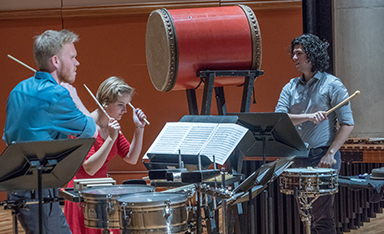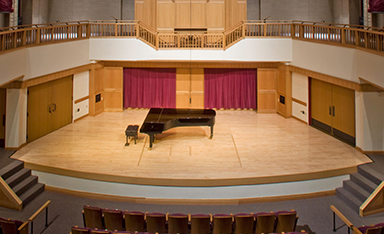Undergraduate Programs
We offer bachelor of music and bachelor of arts degrees, and students can choose an emphasis in classical performance, jazz studies, composition, or recording and production.
What sets us apart as a premier music school? It could be our 300+ performance opportunities, small class sizes, competitive scholarship packages, and award-winning faculty and staff. We instill habits of discipline and critical thinking as well as social and emotional intelligence, equipping you to excel in a variety of roles in the music industry and beyond.
- Majors
Your major is your chosen academic discipline, typically requiring four years of study. In addition to taking classes related to your field, you’ll take in liberal arts courses designed to diversify your learning and ensure you come out of college a well-rounded individual prepared for various professional pursuits. Some students choose their major immediately upon beginning school, while others decide after spending time determining the direction they wish to follow.
- Dual Degrees
A dual degree is a program of study in which students simultaneously pursue their undergraduate and graduate degrees, reducing the time required to achieve both. Typically, students complete their undergraduate studies after three years, as opposed to four, and take two more years to complete their graduate degree.
- Minors
A minor is a student’s secondary academic discipline. It requires a set framework of classes, though it’s less intensive than a major. Minors can either complement a major or give the student the opportunity to study a field in which they’re interested but do not wish to pursue as a major.
College of Arts, Humanities and Social Sciences
Applied Music
About this Program
The Bachelor of Arts in Applied Music is designed for students who are serious about their musical growth and eager to explore a broad academic experience. This degree offers the opportunity to refine your musicianship under the mentorship of our distinguished faculty, while engaging with a wide range of disciplines across the University.
College of Arts, Humanities and Social Sciences
Composition
About this Program
The Bachelor of Music in Composition offers composers rigorous training in composition, harmony, counterpoint, analysis, conducting, orchestration and digital audio — all within the context of a dynamic liberal arts university.
College of Arts, Humanities and Social Sciences
Ethnomusicology
About this Program
The Minor in Ethnomusicology invites students to explore music not only as sound but as a vital expression of culture, identity, the human experience. Through the study of musical traditions from around the world — including popular, traditional, and classical genres — students examine how music functions within diverse societies and across global histories.
College of Arts, Humanities and Social Sciences
Jazz Studies and Commercial Music
About this Program
The Bachelor of Music in Jazz Studies and Commercial Music offers rigorous, career-focused training for students committed to developing as jazz & commercial musicians. Rooted in a deep respect for the jazz tradition and driven by the innovations of the modern scene, this program prepares students for the artistic and professional demands of today’s music industry.
College of Arts, Humanities and Social Sciences
Music
About this Program
The Minor in Music offers students the opportunity to pursue advanced musical study alongside a non-music major. Open to all DU students by audition, this program is ideal for those with prior musical training who wish to continue developing their skills in a focused and supportive environment.
College of Arts, Humanities and Social Sciences
Music Studies
About this Program
The Bachelor of Arts in Music Studies is a non-auditioned degree that provides you with the opportunity to study music through an exciting curriculum, emphasizing music academic courses rather than performance. This degree offers a range of experiences and engagement with music in its many cultural practices and expressive forms.
College of Arts, Humanities and Social Sciences
Performance
About this Program
The Bachelor of Music in Performance offers intensive training in music performance. This selective program is designed for students committed to pursuing excellence in their craft while engaging with the broader intellectual opportunities of a vibrant liberal arts university.
College of Arts, Humanities and Social Sciences
Recording and Production
About this Program
The Bachelor of Music in Recording and Production prepares students for creative and technical leadership in the evolving world of music production. This selective program offers expert training in music performance, recording, mixing, and producing music across a wide range of genres — including classical, jazz, popular, and rock — all within the rich academic environment of a liberal arts university.



